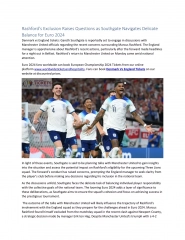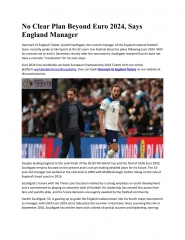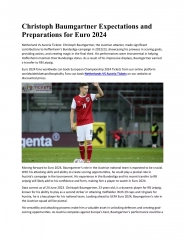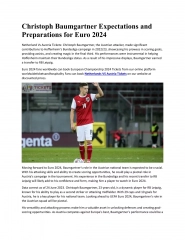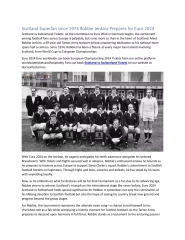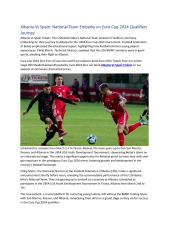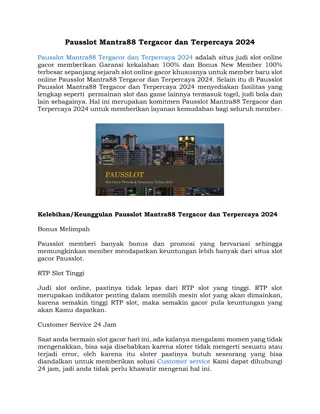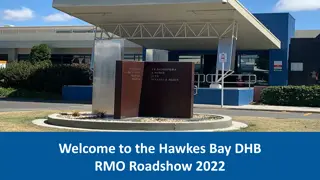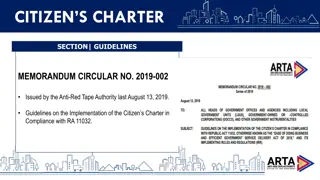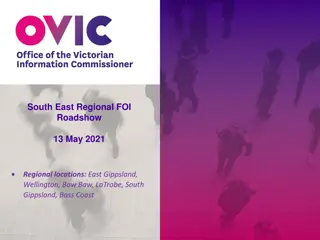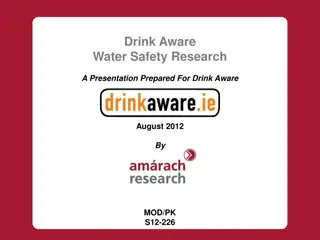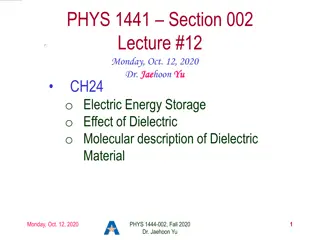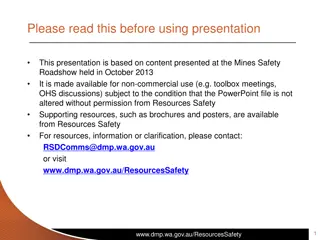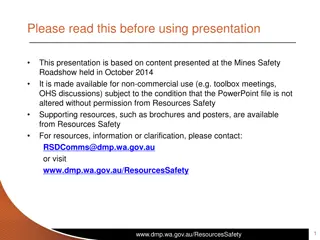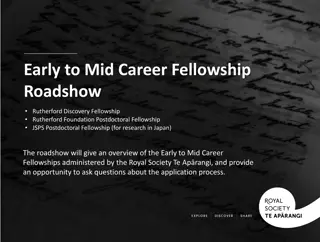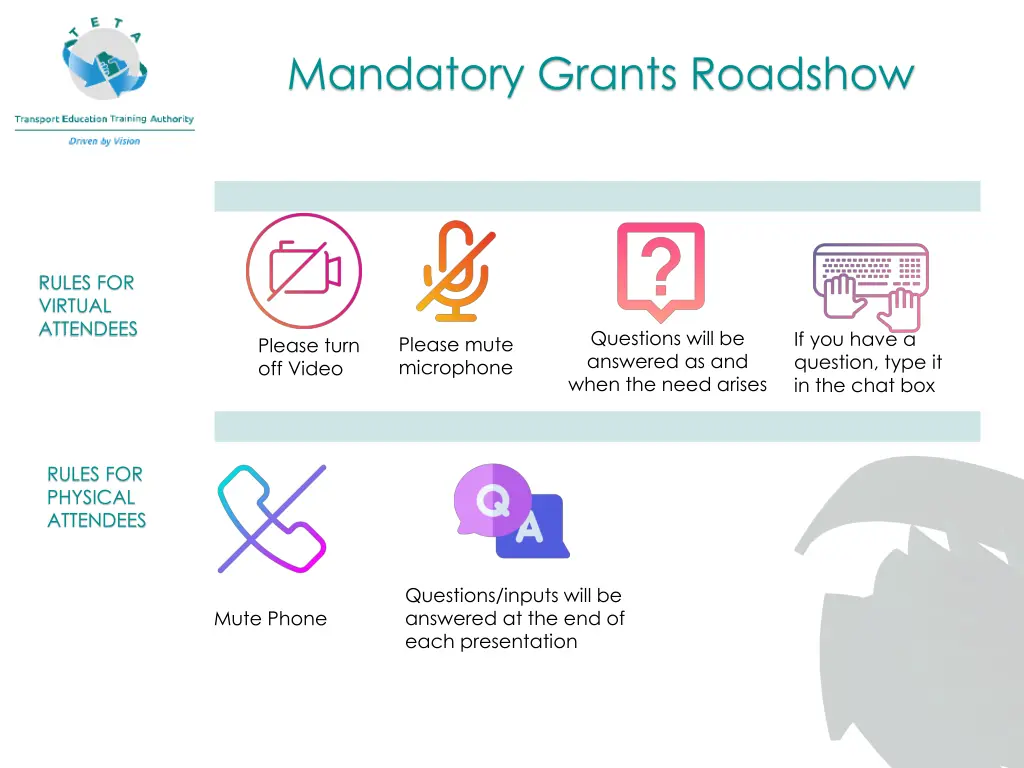
TETA Mandatory Grants Roadshow: Information and Guidelines
Explore the TETA Mandatory Grants Roadshow for valuable insights on SIC codes, training committee requirements, common rejection reasons, and more. Understand the vision, mission, and core values driving the development of a competitive workforce in the transport sector. Discover the sub-sectors and national reach of the Transport SETA. Dive into the legal basis, intervention types, NQF levels, and the MG process. Join the virtual or physical session for detailed presentations and Q&A opportunities.
Download Presentation

Please find below an Image/Link to download the presentation.
The content on the website is provided AS IS for your information and personal use only. It may not be sold, licensed, or shared on other websites without obtaining consent from the author. If you encounter any issues during the download, it is possible that the publisher has removed the file from their server.
You are allowed to download the files provided on this website for personal or commercial use, subject to the condition that they are used lawfully. All files are the property of their respective owners.
The content on the website is provided AS IS for your information and personal use only. It may not be sold, licensed, or shared on other websites without obtaining consent from the author.
E N D
Presentation Transcript
Mandatory Grants Roadshow RULES FOR VIRTUAL ATTENDEES Questions will be answered as and when the need arises If you have a question, type it in the chat box Please mute microphone Please turn off Video RULES FOR PHYSICAL ATTENDEES Questions/inputs will be answered at the end of each presentation Mute Phone
Welcome to Welcome to TETA 2025/26 MANDATORY GRANTS Roadshows Roadshows JANUARY 2025
Presentation Outline 1. TETA Background 2. Mandatory Grants Legal basis ( SDA/SDL and Grant regulation) 3. SIC Codes per Subsector 4. Intervention types 5. NQF Levels 6. MG Process 7. Composition of the training committee 8. Training Committee (TETA s Perspective) 9. Training Committee minutes ( TETA Requirements) 10. Mandatory GRANTS Common reasons for rejections 11. Mandatory Grants System Walkthrough 12. Key Information on the TETA website
Vision and Mission Statements and Core Values BUILDING A FORWARD THINKING AND GLOBALLY COMPETITIVE WORKFORCE BY FACILITATING SKILLS DEVELOPMENT PROGRAMMES THAT SUPPORT THE OUTCOMES OF THE NSDP AND RESPOND TO EMERGING SKILLS NEEDS OF THE TRANSPORT SECTOR TRUST RESPECT RESPONSIBILITY ACCOUNTABILITY POSITIVE ATTITUDE COMMINMENT INSPIRED VISIONARY LEADERSHIP THROUGH SKILLS DEVELOPMENT WITHIN THE TRANSPORT SECTOR VALUES
Sub-sectors of the Transport Sector AEROSPACE FORWARDING & CLEARING TAXI FREIGHT HANDLING ROAD PASSENGER 8 CHAMBERS REPRESENTING EACH SUB-SECTOR MARITIME ROAD FREIGHT RAIL
National Reach by the Transport SETA Freight Handling Chamber TETA has been able to service the entire country despite the offices being only in 5 provinces. Namely Gauteng, Mpumalanga, Limpopo, Kwa-Zulu Natal and Western Cape
Standard Industrial Classification (SIC) Codes per sub-sector BACKGROUND FORWARDING & CLEARING MARITIME 13100 Ocean and Coastal Fishing 71232 Freight Forwarding and 72000 Water Transport Clearing 72111 Coastal Shipping 72112 Ocean Shipping 72200 Inland Water Transport AEROSPACE FREIGHT HANDLING RAIL 73000 Air Transport Including Aviation 71112 Railway Commuter 71300 Transport via Pipelines Freight Handling Maintenance Organisations in this field and Freight Services 74132 Salvaging of Distressed Vessels 73001 Civil Aviation Including Aviation 74110 Cargo Handling Maintenance Organisations in this field 74100 Supporting and Auxiliary Activities Air 74120 Storage and Warehousing Transport 74134 Operations of Airports, Aerodromes & Air Navigation Facilities
Standard Industrial Classification (SIC) Codes per sub-sector BACKGROUND TAXI 71221 Taxis ROAD FREIGHT ROAD PASSENGER 94004 Waste Management 71200 Other Land and Transport 74112 - Tow truck services 71201 Road Transport 74121 - Tow truck services except where tow truck services are ancillary 71211 Urban, Sub-urban, and Inter-urban services to an enterprise where the core business is panel beating. Bus and Coach Passenger Line 71230 Freight Transport by Road 71212 - School Buses
Mandatory Grants Legal Basis The Sector Education Training Authority s (SETAs) Grant Regulations makes provision for the submission of Annexure 2 by levy paying employers in order to claim mandatory funding from the SETAs. A Mandatory Grant is a grant payable to levy paying companies upon submission of Annexure 2 by 30 April each year. Levy paying companies employing 49 or less employees are not required to submit a PIVOTAL Plan and PIVOTAL report however are required to submit WSP and ATR each year. In terms of section 6(3) of Skills Development Levies Act and Paragraph 4 (4) of the SETA Grant Regulations, the SETA shall pay back 20% of the total levies paid by the employer upon approval of the WSP and ATR. Payments for Mandatory Grants shall be made quarterly and any Mandatory Grants not claimed in one year will be transferred to the discretionary grant fund reserve by 15th August each year as stipulated in paragraph 4(7) of the SETA Grant Regulations.
Mandatory Grants Legal Basis SKILLS DEVELOPMENT LEVIES ACT of 1999 4. Are any employers exempt from paying the levy? Yes. The exemptions are applicable if certain provisions are met. You will be able to apply for such exemptions, which you will find in the SDL 101 form, issued by the Commissioner of SARS. SARS will ultimately determine whether you qualify for an exemption or not 5. To whom are the levies payable? Levies are payable to the South African Revenue Service, which acts as a collecting agency for the applicable SETA 6. When are levies payable? The levy must be paid to SARS not later than SEVEN days after the end of the month in respect of which the levy is payable, under cover of a SDL 201 return form. 7. Is there any interest and penalty incurred for late or non-payment? Yes, there is interest and penalty for late or nonpayment of skills Development Levies (SDL)
Mandatory Grants Legal Basis SKILLS DEVELOPMENT LEVIES ACT of 1999 1. What is the aim of the skills development levy? The levy grant scheme, legislated through the Skills Development Levies Act, 1999, serves to fund the skills development initiative in the country. The intention is to encourage a planned and structured approach to learning, and to increase employment prospects for work seekers. Participating fully in the scheme will allow you to benefit from incentives and to reap the benefits of a better skilled and more productive workforce 2. Who must Pay levy? The levy is calculated as 1% of your wage bill, payable monthly. All employers who are registered with South African Revenue Services (SARS) for PAYE and have an annual payroll more than R500 000 must register with SARS to pay for the skills development levy. 3. How does an employer register for the levy? Every employer who is liable to pay the levy must register with SARS by completing the registration form, Form SDL 101, which is available from all SARS offices.
Intervention Types PIVOTAL Training: PIVOTAL is defined as Professional, Vocational, Technical and Academic Learning programmes that result in occupational qualifications or part qualifications on the National Qualifications Framework. The following form part of PIVOTAL training: (NB: Companies employing 50 or more employees submit PIVOTAL plan) Workplace Based Learning Programmes Apprenticeship ARPL Bursaries (TVET/ FET/ NCV/ HET) Skills Programme Occupational Qualifications
NQF Levels Doctoral Degree 10 9 Masters Degree Honours Degree/ Postgraduate Diploma 8 Bachelors Degree/ Advanced Diploma 7 Advanced Diploma Certificate 6 5 Higher Certificate National Certificate 4 3 Intermediate Certificate 2 Elementary Certificate 1 General Certificate
Mandatory Grants Process March December Payments September June
Composition of the Training Committee The Training Committee must consist of three groups: employer representatives, employee representatives, and union representatives (if applicable). The number of employee and employer representatives may be equal; but there cannot be more employer representatives than employee representatives. The SDF cannot be nominated as either an employee or an employer representative. The SDF's role is to coordinate and advise, maintaining objectivity.
Composition of the Training Committee The employee representative must be an employee of the organisation who is nominated or elected by the employees and must not be in a management position. The employee representative s responsibility is to discuss the skills development matters with employees within the organisation, and present employee skills development requirements and aspirations to the Training Committee for discussion and/or implementation.
Composition of the Training Committee (CONTINUED) Employee representatives must represent one of the Major OFO codes presented in the below unless there are no employees in the major OFO category: Major Groups Version 2021 OFO Code Description 2021-1 Managers 2021-2 Professionals Technicians And Associate Professionals 2021-3 2021-4 Clerical Support Workers 2021-5 Service And Sales Workers Skilled Agricultural, Forestry, Fishery, Craft And Related Trades Workers 2021-6 2021-7 Plant And Machine Operators And Assemblers 2021-8 Elementary Occupations
TETAS Training Committee Perspective Medium and large companies are required to set up training committees Training committees are to review performance against submission during the year. Training committees are to endorse the submission made to TETA
Minutes Of The Training Committee Meeting TETA Requirements Companies employing more than 49 employees must submit proof of consultation (with recognised Union) in the form of minutes with the following requirements: Minutes must be on the company letterhead Minutes must be approved signed and dated. Where it is not possible to approve before the submission of the WSP, the signed attendance register of the attendees must accompany the minutes- The minutes must indicate that the submission made to the SETA was discussed and approved. Disclaimer: Small companies (employing 49 or less employees) are exempted from the above requirement however; they can have training committees should they wish.
Mandatory Grants Applications Common Reasons for Declines General Failure to report training implemented on the ATR Medium and large companies who did not submit the following when applying for Mandatory Grants: - ATRs, and WSPs, - PIVOTAL report and PIVOTAL training plans Mandatory grant appeals letter not accompanied by supporting documents as indicated on the reasons for the decline Authorisation Page Not uploaded on the system Not fully completed and signed The duly authorised official do not sign (mainly employer, employee representative and trade union representative where necessary) Signatories do not form part of the training committee and are not captured on the training committee tab The authorisation page provided is not clear Employee Representative on training committee sign as employer representative (and vice versa)
Mandatory Grants Applications Common Reasons for Declines Training Committee Meeting Minutes: Not uploaded on the system; Uploaded on the system but not on the company letterhead; No evidence that the current year s WSP/ATR was discussed; No evidence of approval of the WSP/ATR by the Training Committee; Minutes not signed by relevant signatories (e.g. Employer/Employer labour representative and trade union representative are compulsory for training committee only for large and medium companies) Evidence of consultation must be provided where Trade-unions refuse to sign the authorization page
ATR Evidence Required SMALL COMPANIES LARGE COMPANIES MEDIUM COMPANIES 20% of reported training 5% of reported training 5% of reported training Evidence required for Training: Preferred certificates, SOR or academic transcript. If certificates are not available, Attendance Registers and Invoice and POP.
MG System Demonstration INDICIUM
Critical information to note on the website MG DOCUMENTATION 1 2 Version 2021 OFO Codes Mandatory Grants Policy 3 4 SDF Manual 2025 SDF Presentations 5 6 Guideline for training committee minutes SDF appointment letter template 8 7 ATR evidence guidelines Request for extension guideline/template 9 Appeal letter template
Mandatory Grants Submission Timelines SDF Registration 27 January 2025 MG application period 01 Feb - 30 April 2025 MG Request for the extension period MG Extensions 31 May 2025
Mandatory Grants Support During Submission TETA staff will be available to provide guidance on the system during the time of submission; System queries can be emailed to the relevant chamber Dedicated team to assist with system-related matters and will be available until the 30th of April at 10:00 PM; Chambers will be available for one-on-one meetings to assist with submission- related issues Meetings/assistance will be provided telephonically via Zoom, teams or Google Meet
TETA Contact Details Contact person, telephone, and email address Chamber/Unit Elias Phale +27 11 577 7021 / +27 71 418 5537 | EliasP@teta.org.za Motlatso Mohale +27 11 577 7084 / +27 83 314 2379 | Motlatso@teta.org.za Gaborone Lesito +27 11 577 7015 / +27 60 814 9192 | GaboroneL@teta.org.za Aerospace Tabane Mokgosinyana +27 11 577 7085 / +27 82 833 5223 | Tabane@teta.org.za Phamela Khosa +27 15 917 0006 / +27 72 782 8179 | Phamela.Khosa@teta.org.za Nomfundo Bhengu +27 11 577 7102 / +27 83 967 7876 | NomfundoB@teta.org.za Trevor Tjale +27 11 577 7085 / +27 625 8294 | TjaleT@teta.org.za Nomcebo Vezi +27 31 301 9614 / +27 73 224 9424 | NomceboV@teta.or.za Nokuthula Ngcobo +27 31 334 9883 / +27 74 387 8814 | NokuthulaN@teta.or.za Shantal Marajah +27 31 301 9614 / +27 83 629 7315 | Shantal@teta.org.za Forwarding and Clearing Freight Handling Samuel Motau +27 11 577 7053 / +27 76 742 6207 | SamuelM@teta.org.za Hulisani Thathaisa +27 11 577 7054 / +27 72 672 9174 | HulisaniT@teta.org.za Kate Setjie +27 11 577 7003 / +27 72 768 9394 | Kate@teta.org.za Rail
Contact person, telephone, and email address Chamber/Unit TETA Contact Details Khaya Ngubane +27 11 577 7079 / +27 82 932 9568 | Khaya.Ngubane@teta.org.za Tshitshi Mhlongo +27 11 577 7061 / +27 64 680 7928 | TshitshiM@teta.org.za Masana Hobyani +27 13 912 0005 / +27 71 342 8595 | MasanaH@teta.org.za Trevor Abrahams +27 11 577 7109 / +27 83 556 7713 | TrevorA@teta.org.za Road Freight Juanita Demas +27 11 577 7058 / +27 72 714 0656 | Juanitad@teta.org.za Simphiwe Ntuli +27 11 577 7057/ +27 60 462 6266 | Simphiwe@teta.org.za Trevor Abrahams +27 11 577 7109 / +27 83 556 7713 | TrevorA@teta.org.za Road Passenger Samuel Motau +27 11 577 7053 / +27 76 742 6207 | SamuelM@teta.org.za Hulisani Thathaisa +27 11 577 7054 / +27 72 672 9174 | HulisaniT@teta.org.za Kate Setjie +27 11 577 7003 / +27 78 814 9192 | GaboroneL@teta.org.za Malcolm Alexander +27 21 819 9601 / +27 72 907 0754 | Malcolm@teta.org.za Sanele Mtambo +27 21 819 9602 / +27 78 548 0862 | SaneleM@teta.org.za Rana George +27 21 819 9605 / +27 79 321 4024 | Rana@teta.org.za Victor Muhlberg +27 21 819 9607 / +27 84 304 1067 | Victor@teta.org.za Rail Road Passenger Maritime Simphiwe Ntuli +27 11 577 7057/ +27 61 402 9414 | Simphiwe@teta.org.za Trevor Abrahams +27 11 577 7109 / +27 83 556 7713 | TrevorA@teta.org.za Ndumiso Nzama +27 11 577 7088 / +27 72 578 6351 | NdumisoN@teta.org.za Asanda Makaula +27 11 577 7115 / | AsandaM@teta.org.za Ramodise Tsolo +27 11 577 7105 / +27 78 456 0679 | Ramodise@teta.org.za Taxi Moeketsi Mahlakwana +27 11 577 7078 / +27 65 191 7424| MoeketsiM@teta.org.za Thato Mahlangu +27 11 577 7078 | Thato.M@teta.org.za Sipho Nxumalo +27 11 577 7080 / +27 61 549 6814 | Sipho@teta.org.za Skills Development and Learning Programme
Gauteng Head Office 344 Pretoria Avenue, Ferndale, Randburg, 2194 info@teta.org.za 011 577 7000

